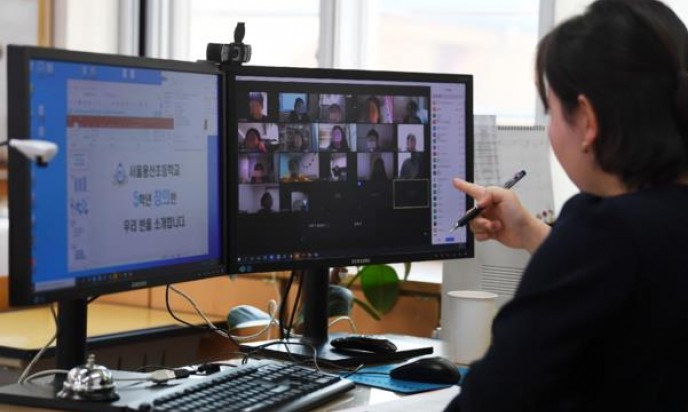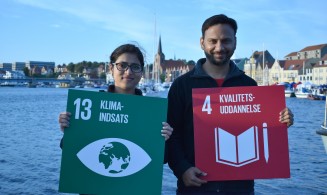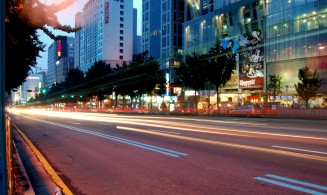

UNESCO learning cities' responses to COVID-19 – outcomes of webinar on 27 May
Goyang

On 27 May 2020, the UNESCO Institute for Lifelong Learning (UIL) hosted a webinar on strategies for educational, social and economic recovery from the COVID-19 pandemic, as part of its ongoing series for members of the UNESCO Global Network of Learning Cities (GNLC). Representatives of the C40 Cities organization provided information on its global mayoral taskforce for recovery; this was followed by expert contributions by from the Universities of Florence and Siena in Italy and Tataj Innovation, an entrepreneurship organization based in Spain. City-level perspectives were provided from Milan in Italy and Goyang in the Republic of Korea.
On behalf of UIL, Marie Macauley opened the webinar by recalling how the onset of the COVID-19 pandemic has demanded a swift response. Now-familiar stories of lockdowns, sudden school closures and social distancing emerged from countries and cities around the world as governments tried to slow the spread of COVID-19 and re-establish some control over a deteriorating situation. Yet, with each new disruption and measure to reduce and restrict human activity, innovative responses have highlighted the capacities of governments, businesses, communities and individuals to adapt. Several months on from the first signs of this virus’s global impact, with many countries and cities around the world beginning to ease restrictions and gradually exit lockdowns, attention remains focused on containing the virus, yet has begun to shift towards what comes next. COVID-19 has taken a profound toll on education systems, economic markets and local communities; initiatives targeting recovery are therefore crucial. This means both repairing the damage done and recalibrating cities so they can cope with the ‘new normal’ of living with COVID-19. It is a huge challenge, and the combined endeavour of all sectors of society is needed for cities to achieve educational, social and economic recovery from the COVID-19 pandemic.
C40 Cities
Ms Caterina Sarfatti, Programme Manager of the Global Mayors COVID-19 Recovery Task Force, introduced C40 Cities as a network of the megacities of the world. Its membership is comprised of 96 cities whose mayors have made a commitment to tackling the climate emergency. C40 represents 700+ million citizens worldwide and a quarter of the global economy. It supports cities in making ambitious commitments to reducing emissions, as well as enhancing the global leadership of mayors to showcase their action. In recent months, it has been a key priority of C40’s mayors to tackle the COVID-19 pandemic; the organization has been repurposed so that existing networks and platforms are at the disposal of cities to share information and to collaborate in response to the health crisis. Mayors have met virtually to share information on health and equity, food and waste, and public space and mobility.
Through its Global Mayors COVID-19 Recovery Task Force, C40 is bringing mayors together to work towards recovery from the COVID-19 pandemic. A number of measures are being undertaken to change cities’ spaces and practices in the long term. For example, recycling patterns have been disrupted, but some cities have provided guidelines for new recycling schemes. Numerous cities have made public spaces available to citizens and repurposed them so that people can continue to move around safely. C40 is supporting cities in gradually easing lockdowns and mayors are feeling the responsibility to find a route to a ‘new normal’. Some cities are experimenting with the ‘15-minute neighbourhood services’ concept, meaning that all local citizens are able to access the key services they need within a 15-minute walk. Mayors have also recognised the value of essential workers in, for example, the food and waste sectors, leading some cities to finally fast-track regularization and formalization processes for informal work. Moving forward, Ms Sarfatti identified several key elements of recovery for cities to consider: how to create new, decent, green jobs accessible to the wider population; improved air quality and its impact on health; public spaces for people and nature; resilience in response to the crisis; equity and social justice; and sustainable investment.
The University of Florence and the University of Siena
Mr Paolo Federighi, professor at the University of Florence, and Ms Francesca Torlone, Senior Researcher at the University of Siena, asserted that COVID-19 has produced changes that will impact our future in terms of how we work and manage learning processes within cities and various contexts. A fledgling research project headed by the two professors has already started to explore a number of topics for recovery – materials have been collected on, for example, the penitentiary system, higher education and medical humanities. In the penitentiary system, there is a tension between the necessity to guarantee health, life and the integrity of inmates and detainees and the tendency to allow infection through poor medical assistance. In higher education, surveys have been organized to gauge responses to COVID-19 and, in the last of these three emerging topics - medical humanities - an observational study is being conducted on 3,000 health cases in Italian cities who are still facing a high risk of COVID-19 infection.
Mr Federighi and Ms Torlone are working with scientists and practitioners from 25 countries to produce contributions and innovative ideas, as well collaborating in focus groups and interviews towards recovery from the COVID-19 pandemic. Their plan is to investigate post-COVID-19 management until December 2020, anticipating that empirical research in learning cities will provide data for reflection, in terms of positive and negative effects of the COVID-19 pandemic. Mr Federighi also pointed to the challenges for adult learning and education, as many adults are now unable to access both work and education. While there have been increased opportunities for white-collar workers to develop skills for flexible work, this has not been the case for blue-collar workers, and so the inequality between groups of workers has increased.
Tataj Innovation
Ms Daria Tataj, Founder and CEO of Tataj Innovation, an entrepreneurship organization based in Spain, argued that most growth emerges from integrated ecosystems where innovation and entrepreneurship work together, including entrepreneurial workplaces and universities. While every city is an innovation ecosystem, in every ecosystem, researchers and innovators tend to work in silos. According to Ms Tataj, cities should therefore invest in university research institutions and create friendly spaces for entrepreneurs, including in small- and medium-sized companies, but also for individuals seeking self-employment. She stressed that science-backed strategies are needed to boost innovation and entrepreneurship in the post-COVID-19 era, including developing the idea of network intelligence, recognising the importance of an entrepreneurial mindset, and fostering digital skills for e-networking to facilitate innovation.
One example Ms Tataj gave was Eindhoven in the Netherlands, which is home to 40% of all patents in the country. The city has two universities – a university of technology and a vocational college – as well as 10,000 high-tech companies. Partnerships between universities and industries have helped stakeholders in the city of Eindhoven to identify knowledge gaps. Ms Tataj called for cities interested in promoting entrepreneurship for recovery to share resources, strengthen partnerships, build strong competences to work as virtual teams, co-create network strategies for building networks fit for specific purposes, and develop e-networking skills.
Milan, Italy
Mr Piero Pelizzaro, Chief Resilience Officer for the city of Milan, presented the core components of the ‘Milan 2020 Adaptation Plan’, which is part of ‘phase two’ of responding to the COVID-19 pandemic. The plan focuses on those areas over which the municipal government has jurisdiction; it does not, therefore, cover measures directly related to healthcare, nor physical distancing measures. The city of Milan has been able to support schools by working to provide more electronic devices and stronger internet connections for families to be able to work and study online. In Milan, there is now less capacity in public transport due to the risks of COVID-19 and there is a need to discourage people from returning to car travel for environmental reasons – the city instead encourages smart working from home and the use of outdoor public spaces.
Additionally, 35 new bike lanes – known as ‘emergency bike lanes’ – have been created in Milan, and restaurants have been helped to enlarge their outdoor seating areas in order to maintain physical distancing. Echoing an initiative mentioned by Ms Sarfatti, Milan is trying to ensure that citizens can access all services within 15 minutes of leaving their homes. Support has also been provided to vulnerable populations to help them meet rent payments. Finally, as Milan is a capital of design, it wants to encourage other cities to engage with design in responding to, and recovering from, the COVID-19 pandemic.
UNESCO learning city of Goyang, Republic of Korea
Mr Kim HoSeok, Chief of the Lifelong Learning Centre team in Goyang’s Lifelong Education Department, summarised the current situation in the city of Goyang by explaining that the local drive-through testing centre has helped to keep the numbers of cases down and has now stopped operating due to a stabilisation of the COVID-19 situation. Goyang has formulated a recovery plan in recognition that the economy is almost in freefall due to the COVID-19 pandemic, jobs are disappearing, and shop owners are struggling to pay their rent. Direct and effective support must be provided. In terms of economic measures, the city has provided emergency support for welfare: all citizens of Goyang will receive around USD 500 per person. The municipal government has also extended deadlines and provided tax relief for enterprises, while tackling massive unemployment by creating temporary jobs such as emergency quarantine teams.
In education, a new semester began online in April, and in May students returned to school. The municipal government of Goyang has provided ventilators and personal protective equipment to schools to ensure safety on school premises. Thermal-imaging cameras have also been installed and the city has worked with schools to prepare for more blended learning in the long term. Mr Kim stressed that recovery also means restoring social relations and moving to ‘routine distancing’. This refers to a series of health- and hygiene-related measures designed to be sustainable, such as staying at home for three or four days if sick and keeping a distance of two arms’ length. Recovery from the COVID-19 pandemic means maintaining solidarity and adapting to a new familiarity. This will not succeed with policies implemented by municipal governments alone – civil society is needed for measures to succeed.
Résumé
The Director of UIL, Mr David Atchoarena, closed the webinar by pointing to the tensions found in policy responses to the COVID-19 pandemic due to competing priorities, as well as a difficult combination of health concerns and economic responses. Cities’ approaches vary in terms of how high economic recovery should be on the agenda, and there has been a tension is establishing appropriate time frames for implementing and maintaining measures. Despite differing responses, cities are asking themselves the same question: how can we speed up the transition from emergency to recovery? With regard to governance, there are different levels within decentralised systems, meaning that cities have different levels of autonomy in education and other areas of public life. We have seen some complementarities between national and local policies, but in some cases cities have developed policies that are very different from national policies.
The impact on the labour market has been marked. New forms of working have emerged, yet there has also been an impact on the identity of workers and occupations built around communities; it remains to be seen whether traditional communities centred on specific types of work and training can be rebuilt around new modes of working. The webinar showcased interesting illustrations of how cities are combining different levels of intervention for different policy areas, including new jobs and public transportation, as well as the key role that universities can play. Mr Atchoarena concluded that the importance of culture should not be forgotten, as it can be instrumental in restoring the social link that has been partly destroyed during lockdowns. Social relations remain crucial, and it is important to open up to others and ensure citizenship through education.
GNLC webinars
The online event was part of the GNLC webinar series featuring ‘UNESCO learning cities’ responses to COVID-19’. Devised as an opportunity for members of the UNESCO Global Network of Learning Cities (GNLC) to share successful local initiatives during the pandemic, the webinars regularly attract hundreds of city representatives and other stakeholders. Cities from different world regions give presentations, and participants engage in thought-provoking debates about how best to deal with the current situation – namely, how to mitigate its worst effects and, in some way, seize unexpected opportunities. Click on the links below to read summaries of the twelve previous webinars.
UNESCO learning cities’ responses to COVID-19: Open distance learning. Outcomes of webinar on 6 May
UNESCO learning cities’ responses to COVID-19: The cases of Évry-Courcouronnes (France), Chefchaouen (Morocco), Mayo-Baléo (Cameroon), and the Association internationale des Maires Francophones (AIMF). Outcomes of webinar on 23 April
Don’t miss the opportunity to join our upcoming webinars. Further details can be found at https://uil.unesco.org/event/gnlc-webinars-unesco-learning-cities-response-covid-19.
Watch our video interviews with mayors and other representatives of UNESCO learning cities on responses to COVID-19 at https://www.youtube.com/playlist?list=PLivu_GCiL2mjYQOp64hcvzGNsC75QKSLw










